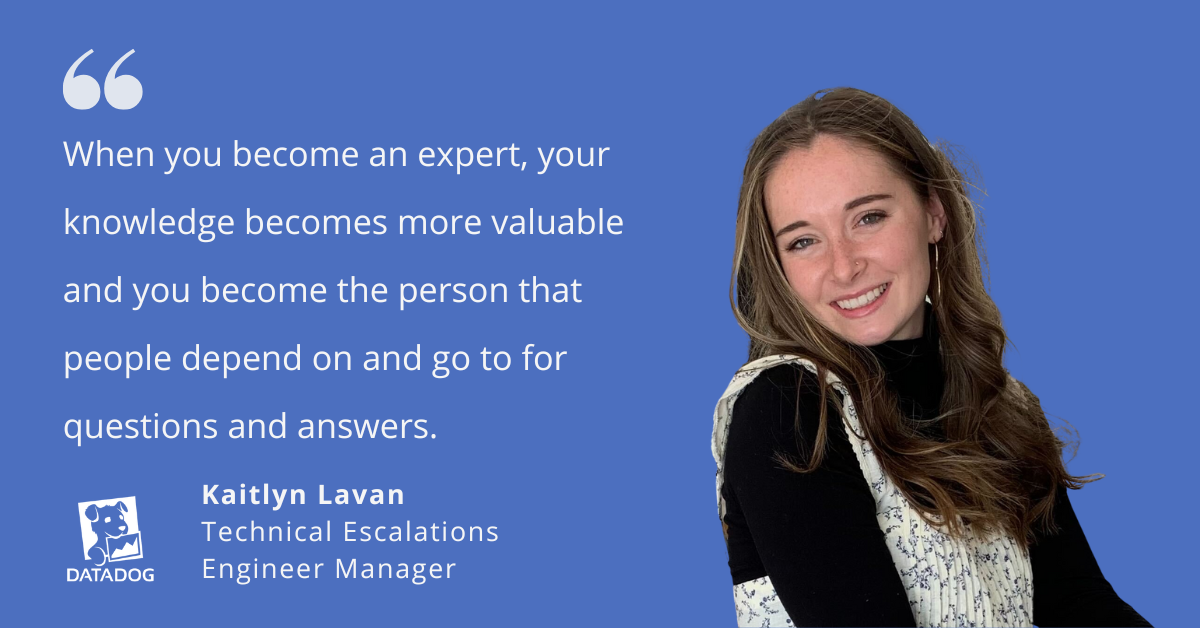The tech space might not be a stereotypical hub for creativity, but according to Datadog's Kaitlyn Lavan, she engages in innovative problem-solving nearly daily as a technical escalations engineer manager.
“When you’re trying to solve a problem in tech, it’s about finding the most efficient or effective way to solve that problem,” she explains. “And sometimes that means being creative.”
Creativity is just one of the many skills Kaitlyn has tapped into as she’s developed her technical expertise over the last three years.
We met with Kaitlyn to learn how she succeeded in a career field that was once brand new to her, and to hear her advice on developing technical expertise, regardless of your background.
Pursuing a Love of Sciences
Kaitlyn started her studies intent on joining the business school, but quickly realized that science was more her forte.
“While most people were trying to transfer into the business school, I had decided that it was not the direction that I wanted to go in,” she admits.
As it turned out, studying general sciences was a better match for her because it introduced her to computer science.
“I'd never taken a computer science class before and I ended up loving it,” she explains. “I learned how to code and I was completely enthralled.”
Captivated by the world of computers, she ended up minoring in computer science, which helped set the foundation for her future career in tech.
Starting a Career with Datadog
As an undergraduate student considering internships, Kaitlyn was hesitant to dive headfirst into a tech career. Instead, she started working in a tech-adjacent field at a cancer hospital focused on health informatics.
“I met with engineers that were working in the labs,” she shares. “They were coding for different experiments and running tests to detect cancer-causing genes. I thought if I could do that, or something like that, it’d be great.”
When opportunities didn’t open up at her internship, she decided to turn to the job market. Call it fate or just a perfect match, Kaitlyn noticed a message in her LinkedIn inbox from a Datadog recruiter.
Datadog is the SaaS-based monitoring and security platform for cloud-scale infrastructure, applications, logs, and more.
“After looking up the company, I decided to have a conversation with the recruiter, and she spoke so highly of Datadog,” Kaitlyn shares.
Although she enjoyed the initial introduction, Kaitlyn felt a bit uneasy about working for a tech company.
“When you think of the tech space, you think of Silicon Valley and rooms filled with white men, so I was a little concerned about the culture of a tech company,” she explains.
Yet throughout her interview process, Kaitlyn was reassured that Datadog was an inclusive space.
“When I sat down with the panel, there was always at least one woman in each of my interviews,” she shares. “I’d ask them how they felt about working at Datadog, and they all had positive things to say.”
Kaitlyn eventually accepted the offer from Datadog and has been thriving within the company ever since.
Building Her Tech Expertise
Kaitlyn started off her career at Datadog as a technical support engineer focused on customer support. This meant solving problems that she didn’t always have the answers to, so she relied on the collaboration of different product area experts.
“In the beginning, I’d often go to the product experts with questions, and I was impressed with how far they could take their investigations,” she explains. “They were always reproducing really complex customer issues and they could read the code base and come up with creative solutions to different problems.”
It was this admiration that encouraged Kaitlyn to become a containers product area expert.
“When I started at Datadog, I had never heard of containers,” she recalls. “I remember doing live chats with our customers, and one day someone came onto chat asking about containers. It was as if they were speaking a foreign language to me.”
(If you’re scratching your head now the way Kaitlyn was then about what these kinds of containers are, not to worry! Here’s Kaitlyn’s 60-second summary: “A container is an isolated and small unit of software that packages up code and all its dependencies so an application can run quickly and reliably from one computing environment to another. Container usage is continuing to grow among modern engineering teams. It's trending upwards and is an important player in how companies are running their applications.”)
“After that moment I never wanted to be that unsure again, so I told myself to learn as much as I could about these containers.”
Fortunately, Datadog holds 10-week specialty sessions.
“During these sessions, you do a deep dive on a product area and learn as much as you can,” Kaitlyn explains. “There were office hours where you could ask additional questions. I was at every office hour, trying to absorb as much as I could.”
Thanks to her dedication and diligence, she was a top candidate when a technical escalation engineering position with a focus in containers opened up within the company.
Advice for Developing Your Technical Expertise
Kaitlyn knew that focusing on one particular field would help her succeed in the fast-paced tech environment.
“When you become an expert, your knowledge becomes more valuable and you become the person that people depend on and go to for questions and answers,” she explains.
If you’re looking to build your expertise, Kaitlyn offers the following advice:
- Gain hands-on experience. Studying information can give you a basic understanding, but experience is the best teacher. “You can read articles, blog posts, and books about a certain area, but until you get hands-on experience to see how something works, you won’t be comfortable with it,” Kaitlyn says.
- Pick one skill and become an expert. “You become indispensable when you're the expert,” she shares. “This is a huge advantage. If you can, hone in on one thing and then just learn all you can about it. People will start to seek out your guidance.”
- Persevere: “The beginning is going to be hard and it is going to be intimidating, but learn from your mistakes, and keep moving forward,” says Kaitlyn.
“You might start off in a space where you feel you don’t belong, but you can make space for yourself by expanding your knowledge.”
If you’re looking for a space to develop your technical expertise, check out the open roles at Datadog.




